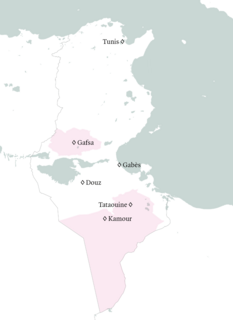In Tataouine
Layli Foroudi
The road to Tataouine from the phosphate-producing region of Gafsa was blocked by young people protesting for jobs and development. I made a U-turn and headed back towards the west. When I got to Douz, people were cooking their dinner on open fires: the region had no gas because of protests two hours away in Gabès; they were demanding the same thing. The road from Douz to Tataouine was clear, though the petrol stations were empty because of other roadblocks towards the coast.
A social movement in the region had closed a fuel pipeline valve for 115 days, from 16 July to 8 November, when – having failed to suppress it by force – the government agreed to their demands for job creation and investment. When I was there last month, the protesters’ representatives were meeting with government envoys to discuss the details, alongside union members and local experts. Galvanised, unemployed youth in other regions hope to do the same.
Tataouine makes up more than one-fifth of Tunisia by area and is rich in resources, most of which are extracted and transported away.Six oil and gas companies – four international and two Tuniso-Italian – are drillingin the desert, near the Sahara’s largest underground water reserve. In 2012, Nasa scientists came to Tataouine to take a sample from a meteorite to prove that there was water on Mars. Pieces of another meteorite, which landed in 1931, have been sold in Parisian jewellery stores. A group of Italian researchers tried to make off with a collection of dinosaur bones in 2011 but they were stopped at customs after a civil society campaign.
The dinosaur bones were taken to the Bardo National Museum in Tunis and stored in boxes. Apparently some broke. ‘At least they are in Tunisia,’ Dhaoui Moussa, a local historian, told me. But the Kamour social movement – active since 2017, and named after the area where the pipeline valve is located, more than 100 km from the city of Tataouine – is not content to leave things to Tunis. In the sixty years since independence from France, wealth has not trickled down to the country’s south.
As part of the transitional justice process launched after Tunisia’s revolution ten years ago, entire regions could apply for ‘victim’ status to demand recognition and compensation for having been marginalised by the state. Tataouine has nine files open. During the colonial period, the border region was an important base for the armed resistance led by supporters of Salah Ben Youssef, later a rival to the first president, Habib Bourguiba. A month after the declaration of independence in 1956, two battles took place in the mountains between the Youssefists and French armed forces. At least seventy Tataouinians died. Moussa collected bones from the battlefields for laboratory analysis. ‘Since then,’ he told me, ‘Tataouine was neglected by Bourguiba and the government … There is no work – tomorrow morning you will see this café packed, there are young people that do absolutely nothing.’
Oil was discovered in Tataouine in the mid-1960s but by 2010 only 5 per cent of jobs in the industry were filled by local people, according to the union. The first lycée opened in 1969, 13 years after independence. Healthcare is poor; Covid-19 patients are sent to a neighbouring region for treatment. The townspeople built a public hall in the early 1960s; it was later appropriated by the ruling party of Zine el Abidine Ben Ali, until he was toppled in 2011. A defaced mosaic outside the building still shows traces of the party logo. (The person who vandalised it during the revolution was told by others, as a joke, that Ben Ali hadn’t really fled the country; he hid in his house for a week.)
Tataouine has the highest unemployment rate in Tunisia: 33 per cent, rising to 53 per cent for young people in 2018. The national average is 16 per cent, compared to 13 per cent before the revolution; the current figures don’t account for all the job losses from the Covid-19 pandemic. ‘People opened their eyes after the revolution,’ according to Chnib Mosbah. ‘They had more freedom – they were able to see their oppression and demand their rights, something that wasn’t possible before.’ Mosbah, a 65-year-old Arabic teacher, was a political dissident under Ben Ali. The protesters asked him to be at Kamour for the closing of the valve in July. He stood in the front line to ensure that the army did not react with violence.
‘Apart from employment and everything, the battle is about deciding who the boss is. The boss should regain his position. And the boss is the people,’ Tarak Haddad, 37, a leader of the Kamour protest, told me. He’d spent the day negotiating with the government. ‘Every Tunisian citizen has the right to live decently.’ If the government doesn't fulfil its role, he said, ‘I will block the country.’
The discussion that day had centred on the creation of a thousand new jobs in a ‘gardening company’ – an idea developed in2008 after a revolt in Gafsa. It’s a form of unemployment benefit: gardening company employees have no work to do, but are paid by the state. The post-revolutionary government created similar companies in four other regions, including Tataouine (where Haddad says they do work). The total number of supposed gardeners is now 17,500. Some of them have started protesting for actual work.
